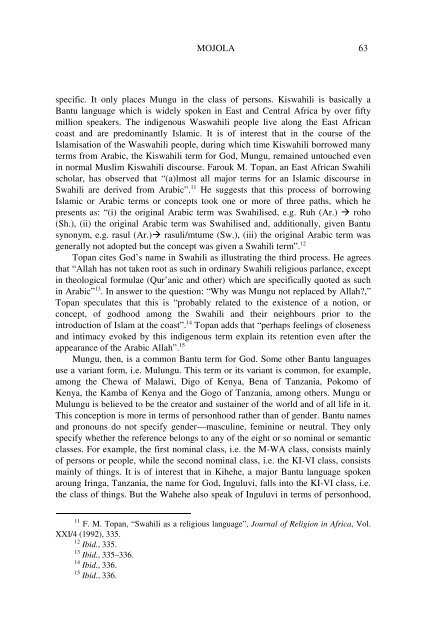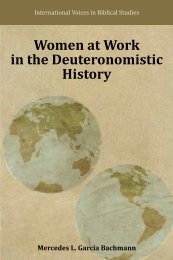Global Hermeneutics? - International Voices in Biblical Studies ...
Global Hermeneutics? - International Voices in Biblical Studies ...
Global Hermeneutics? - International Voices in Biblical Studies ...
You also want an ePaper? Increase the reach of your titles
YUMPU automatically turns print PDFs into web optimized ePapers that Google loves.
MOJOLA 63<br />
specific. It only places Mungu <strong>in</strong> the class of persons. Kiswahili is basically a<br />
Bantu language which is widely spoken <strong>in</strong> East and Central Africa by over fifty<br />
million speakers. The <strong>in</strong>digenous Waswahili people live along the East African<br />
coast and are predom<strong>in</strong>antly Islamic. It is of <strong>in</strong>terest that <strong>in</strong> the course of the<br />
Islamisation of the Waswahili people, dur<strong>in</strong>g which time Kiswahili borrowed many<br />
terms from Arabic, the Kiswahili term for God, Mungu, rema<strong>in</strong>ed untouched even<br />
<strong>in</strong> normal Muslim Kiswahili discourse. Farouk M. Topan, an East African Swahili<br />
scholar, has observed that “(a)lmost all major terms for an Islamic discourse <strong>in</strong><br />
Swahili are derived from Arabic”. 11 He suggests that this process of borrow<strong>in</strong>g<br />
Islamic or Arabic terms or concepts took one or more of three paths, which he<br />
presents as: “(i) the orig<strong>in</strong>al Arabic term was Swahilised, e.g. Ruh (Ar.) � roho<br />
(Sh.), (ii) the orig<strong>in</strong>al Arabic term was Swahilised and, additionally, given Bantu<br />
synonym, e.g. rasul (Ar.)� rasuli/mtume (Sw.), (iii) the orig<strong>in</strong>al Arabic term was<br />
generally not adopted but the concept was given a Swahili term”. 12<br />
Topan cites God’s name <strong>in</strong> Swahili as illustrat<strong>in</strong>g the third process. He agrees<br />
that “Allah has not taken root as such <strong>in</strong> ord<strong>in</strong>ary Swahili religious parlance, except<br />
<strong>in</strong> theological formulae (Qur’anic and other) which are specifically quoted as such<br />
<strong>in</strong> Arabic” 13 . In answer to the question: “Why was Mungu not replaced by Allah?,”<br />
Topan speculates that this is “probably related to the existence of a notion, or<br />
concept, of godhood among the Swahili and their neighbours prior to the<br />
<strong>in</strong>troduction of Islam at the coast”. 14 Topan adds that “perhaps feel<strong>in</strong>gs of closeness<br />
and <strong>in</strong>timacy evoked by this <strong>in</strong>digenous term expla<strong>in</strong> its retention even after the<br />
appearance of the Arabic Allah”. 15<br />
Mungu, then, is a common Bantu term for God. Some other Bantu languages<br />
use a variant form, i.e. Mulungu. This term or its variant is common, for example,<br />
among the Chewa of Malawi, Digo of Kenya, Bena of Tanzania, Pokomo of<br />
Kenya, the Kamba of Kenya and the Gogo of Tanzania, among others. Mungu or<br />
Mulungu is believed to be the creator and susta<strong>in</strong>er of the world and of all life <strong>in</strong> it.<br />
This conception is more <strong>in</strong> terms of personhood rather than of gender. Bantu names<br />
and pronouns do not specify gender—mascul<strong>in</strong>e, fem<strong>in</strong><strong>in</strong>e or neutral. They only<br />
specify whether the reference belongs to any of the eight or so nom<strong>in</strong>al or semantic<br />
classes. For example, the first nom<strong>in</strong>al class, i.e. the M-WA class, consists ma<strong>in</strong>ly<br />
of persons or people, while the second nom<strong>in</strong>al class, i.e. the KI-VI class, consists<br />
ma<strong>in</strong>ly of th<strong>in</strong>gs. It is of <strong>in</strong>terest that <strong>in</strong> Kihehe, a major Bantu language spoken<br />
aroung Ir<strong>in</strong>ga, Tanzania, the name for God, Inguluvi, falls <strong>in</strong>to the KI-VI class, i.e.<br />
the class of th<strong>in</strong>gs. But the Wahehe also speak of Inguluvi <strong>in</strong> terms of personhood,<br />
11 F. M. Topan, “Swahili as a religious language”, Journal of Religion <strong>in</strong> Africa, Vol.<br />
XXI/4 (1992), 335.<br />
12 Ibid., 335.<br />
13 Ibid., 335–336.<br />
14 Ibid., 336.<br />
15 Ibid., 336.




